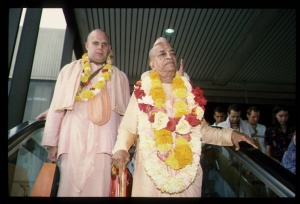CC Adi 6.97: Difference between revisions
m (1 revision(s)) |
No edit summary |
||
| Line 1: | Line 1: | ||
{{ | [[Category:Sri Caitanya-caritamrta - Adi-lila Chapter 06|C097]] | ||
<div style="float:left">'''[[Sri Caitanya-caritamrta|Śrī Caitanya-caritāmṛta]] - [[CC Adi|Ādi-līlā]] - [[CC Adi 6|Chapter 6: The Glories of Śrī Advaita Acārya]]'''</div> | |||
<div style="float:right">[[File:Go-previous.png|link=CC Adi 6.96|Ādi-līlā 6.96]] '''[[CC Adi 6.96|Ādi-līlā 6.96]] - [[CC Adi 6.98|Ādi-līlā 6.98]]''' [[File:Go-next.png|link=CC Adi 6.98|Ādi-līlā 6.98]]</div> | |||
{{CompareVersions|CC|Adi 6.97|CC 1975|CC 1996}} | |||
{{RandomImage}} | |||
==== TEXT 97 ==== | ==== TEXT 97 ==== | ||
<div | <div class="verse"> | ||
e-sabāke śāstre kahe ‘bhakta-avatāra’ | :e-sabāke śāstre kahe ‘bhakta-avatāra’ | ||
‘bhakta-avatāra’-pada upari sabāra | :‘bhakta-avatāra’-pada upari sabāra | ||
</div> | </div> | ||
| Line 12: | Line 16: | ||
==== SYNONYMS ==== | ==== SYNONYMS ==== | ||
<div | <div class="synonyms"> | ||
e- | ''e-sabāke''—all of them; ''śāstre''—the scriptures; ''kahe''—say; ''bhakta-avatāra''—incarnations as devotees; ''bhakta-avatāra''—of such an incarnation as a devotee; ''pada''—the position; ''upari sabāra''—above all other positions. | ||
</div> | </div> | ||
| Line 19: | Line 23: | ||
==== TRANSLATION ==== | ==== TRANSLATION ==== | ||
<div | <div class="translation"> | ||
The scriptures call them incarnations as devotees [bhakta-avatāra]. The position of being such an incarnation is above all others. | The scriptures call them incarnations as devotees [bhakta-avatāra]. The position of being such an incarnation is above all others. | ||
</div> | </div> | ||
| Line 26: | Line 30: | ||
==== PURPORT ==== | ==== PURPORT ==== | ||
<div | <div class="purport"> | ||
The Supreme Personality of Godhead appears in different incarnations, but His appearance in the role of a devotee is more beneficial to the conditioned souls than the other incarnations, with all their opulences. Sometimes a conditioned soul is bewildered when he tries to understand the incarnation of Godhead with full opulence. Lord Kṛṣṇa appeared and performed many uncommon activities, and some materialists misunderstood Him, but in His appearance as Lord Caitanya He did not show much of His opulences, and therefore fewer conditioned souls were bewildered. Misunderstanding the Lord, many fools consider themselves incarnations of the Supreme Personality of Godhead, but the result is that after leaving the material body they enter the species of jackals. Persons who cannot understand the real significance of an incarnation must attain such lower species of life as punishment. Conditioned souls who are puffed up by false egoism and who try to become one with the Supreme Lord become Māyāvādīs. | The Supreme Personality of Godhead appears in different incarnations, but His appearance in the role of a devotee is more beneficial to the conditioned souls than the other incarnations, with all their opulences. Sometimes a conditioned soul is bewildered when he tries to understand the incarnation of Godhead with full opulence. Lord Kṛṣṇa appeared and performed many uncommon activities, and some materialists misunderstood Him, but in His appearance as Lord Caitanya He did not show much of His opulences, and therefore fewer conditioned souls were bewildered. Misunderstanding the Lord, many fools consider themselves incarnations of the Supreme Personality of Godhead, but the result is that after leaving the material body they enter the species of jackals. Persons who cannot understand the real significance of an incarnation must attain such lower species of life as punishment. Conditioned souls who are puffed up by false egoism and who try to become one with the Supreme Lord become Māyāvādīs. | ||
</div> | </div> | ||
__NOTOC__ | |||
<div style="float:right; clear:both;">[[File:Go-previous.png|link=CC Adi 6.96|Ādi-līlā 6.96]] '''[[CC Adi 6.96|Ādi-līlā 6.96]] - [[CC Adi 6.98|Ādi-līlā 6.98]]''' [[File:Go-next.png|link=CC Adi 6.98|Ādi-līlā 6.98]]</div> | |||
__NOTOC__ | |||
__NOEDITSECTION__ | |||
Revision as of 08:50, 22 September 2021

A.C. Bhaktivedanta Swami Prabhupada
TEXT 97
- e-sabāke śāstre kahe ‘bhakta-avatāra’
- ‘bhakta-avatāra’-pada upari sabāra
SYNONYMS
e-sabāke—all of them; śāstre—the scriptures; kahe—say; bhakta-avatāra—incarnations as devotees; bhakta-avatāra—of such an incarnation as a devotee; pada—the position; upari sabāra—above all other positions.
TRANSLATION
The scriptures call them incarnations as devotees [bhakta-avatāra]. The position of being such an incarnation is above all others.
PURPORT
The Supreme Personality of Godhead appears in different incarnations, but His appearance in the role of a devotee is more beneficial to the conditioned souls than the other incarnations, with all their opulences. Sometimes a conditioned soul is bewildered when he tries to understand the incarnation of Godhead with full opulence. Lord Kṛṣṇa appeared and performed many uncommon activities, and some materialists misunderstood Him, but in His appearance as Lord Caitanya He did not show much of His opulences, and therefore fewer conditioned souls were bewildered. Misunderstanding the Lord, many fools consider themselves incarnations of the Supreme Personality of Godhead, but the result is that after leaving the material body they enter the species of jackals. Persons who cannot understand the real significance of an incarnation must attain such lower species of life as punishment. Conditioned souls who are puffed up by false egoism and who try to become one with the Supreme Lord become Māyāvādīs.